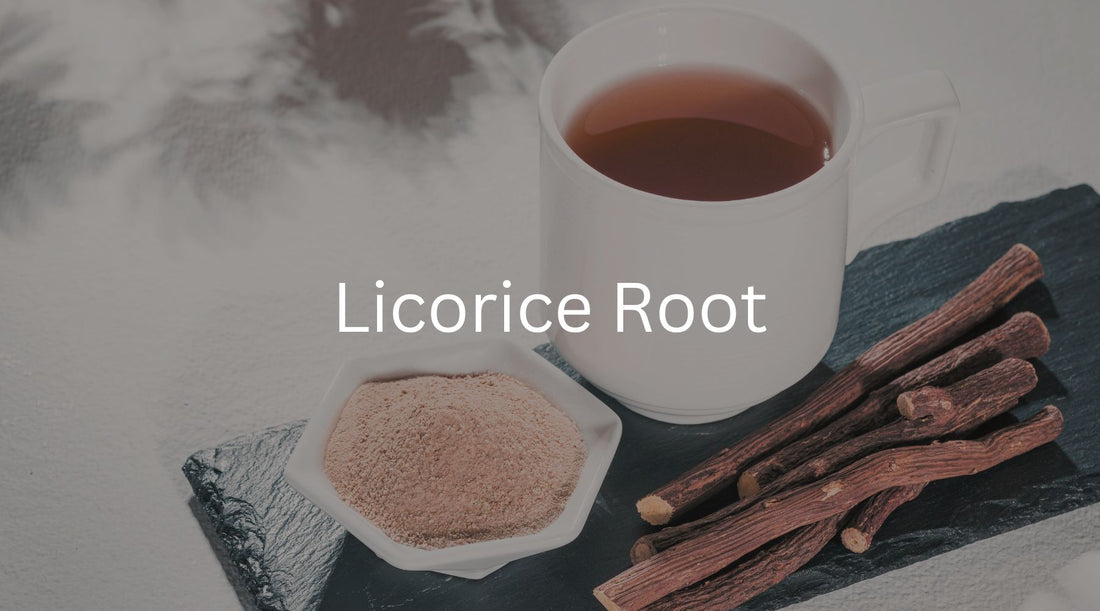Imagine you could have a sweet treat that not only satisfies your cravings, but also boosts your immune system, soothes your stomach, and balances your hormones. Sounds too good to be true, right?
Well, it's not. It's licorice root, and it's one of the most powerful natural remedies you can find.

What is Licorice Root?
Licorice root is the root of the Glycyrrhiza glabra plant which is naturally sweet taste and is often used in herbal tea blends to balance out the bitterness of other ingredients. This is one of the most important herbs in herbalist medicines.

History and Culture
Licorice root has a long history of medicinal and culinary uses. In ancient Egypt, it was used as a sweetener and a remedy for coughs and sore throats. In China, it was one of the most common herbs in traditional medicine, used to harmonize other herbs and treat various ailments such as ulcers, asthma, inflammation and skin problems. In Europe, it was popular as a flavoring agent for beverages, candies and tobacco. In India, it was used in Ayurveda to balance the doshas (energies) and treat digestive issues, respiratory infections and stress.
How Can It Benefit You?
What are the benefits of licorice root for modern-day consumers? Well, there are many reasons to include this herb in your diet, especially if you enjoy drinking herbal teas. Here are some of the benefits of licorice root tea:
Soothes the Digestive System
Licorice root has anti-inflammatory and anti-spasmodic properties that can help relieve symptoms of indigestion, acid reflux, stomach ulcers, irritable bowel syndrome and gastritis. It also stimulates the production of mucus in the stomach lining, which protects it from damage by acids and bacteria.
Supports the Immune System
Licorice root has antiviral, antibacterial and antifungal properties that can help fight off infections and boost the body's natural defenses. It also modulates the immune response by regulating the levels of cortisol, the stress hormone that can suppress the immune system when chronically elevated.
Improves the Respiratory System
Licorice root has expectorant and demulcent properties that can help loosen and expel mucus from the lungs and throat, making it easier to breathe. It also soothes irritation and inflammation caused by allergies, asthma, bronchitis, colds and coughs.
Enhances the Endocrine System
Licorice root has adaptogenic properties that can help the body cope with stress and balance the hormones. It can also mimic the effects of estrogen in the body, which can help relieve symptoms of menopause such as hot flashes, mood swings and osteoporosis.
Nourishes The Skin
Licorice root has antioxidant and anti-aging properties that can help protect the skin from free radical damage and environmental toxins. It also inhibits the production of melanin, the pigment that causes dark spots and hyperpigmentation on the skin.

Hope To Make Licorice Root Tea
If you want to try licorice root tea, you can either buy it ready-made or make your own at home. To make your own licorice root tea, you will need:
- 1 teaspoon of dried licorice root (you can find it online or in health food stores)
- 1 cup of boiling water
- Honey or lemon (optional)
Simply steep the licorice root in the boiling water for 10 minutes, then strain and enjoy. You can add honey or lemon to enhance the flavor if you like. You can drink up to 3 cups of licorice root tea per day, but not more than 6 weeks in a row.
Licorice root tea is a delicious way to reap the benefits of this ancient herb. Give it a try and see how it makes you feel!
Options
When it comes to picking the right tea for the right moment, it is really up to your preferences. However, we recommend if you want a relaxing moment to unwind, stay clear of caffeinated teas.
Our Bear Hug and Reishi Realms are perfect for an afternoon and evening and are filled with licorice root.
Precaution
When drinking herbal tea for anxiety or stress, it's important to remember that it's not a substitute for professional help. If you're struggling with mental health issues, it's important to seek help from a qualified healthcare provider. Herbal tea can be a supportive addition to your treatment plan, but it's not a replacement for professional care.
Citations
- Link - Herbal support for Adrenal Function.
- Link - A Review of the Pharmacological Efficacy and Safety of Licorice Root from Corroborative Clinical Trial Findings.
- Link - An "essential herbal medicine"-licorice: A review of phytochemicals and its effects in combination preparations.
- Link - Licorice and cancer.
- Link - Licorice: Resources, applications in ancient and modern times.
- Link - Potentiating effect of glabridin on GABAA receptor-mediated responses in dorsal raphe neurons.

